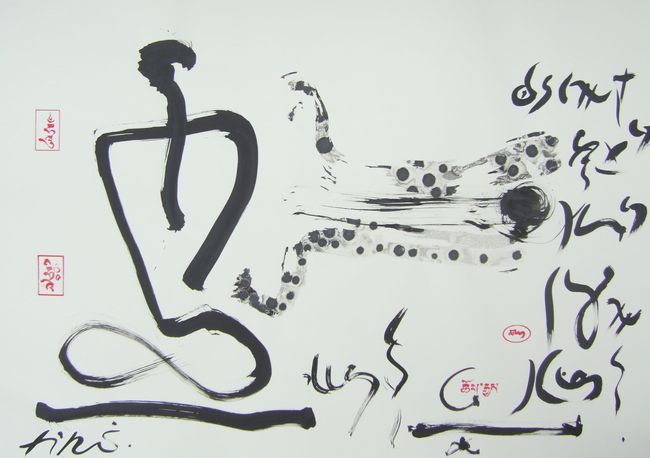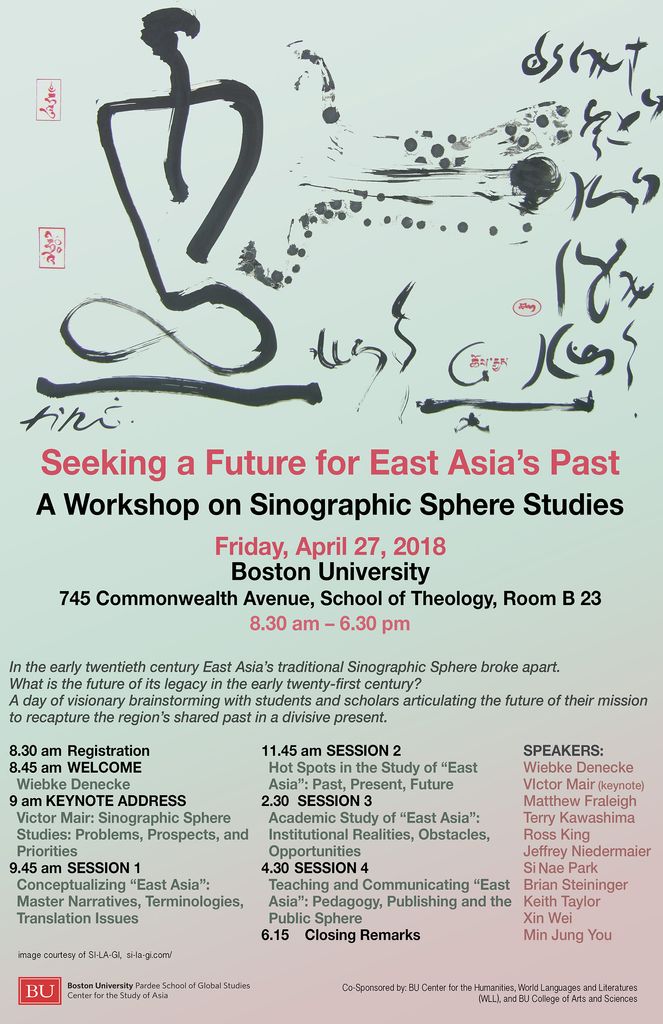Seeking a Future for East Asia’s Past: Sinographic Sphere Studies, April 27
Seeking a Future for East Asia’s Past:
A Workshop on Sinographic Sphere Studies
Friday, April 27, 2018 from 8:30 a.m. to 6:30 p.m.
Boston University

“16-tibetan-art-calligraphy-practice-IV-china-ink.” Calligraphy by SI-LA-GI
(Szabolcs Szilágyi), courtesy of the artist, http://www.si-la-gi.com
Co-sponsored by the Boston University’s Center for the Humanities, the Center for the Study of Asia, Department of World Languages and Literatures, and the College of Arts and Sciences
This workshop will take place at
Boston University School of Theology STH B23, (745 Commonwealth Ave., Boston)
from 8:30 am to 6:30 pm
In the early twentieth century, East Asia’s traditional Sinographic Sphere broke apart. What is the future of its legacy in the early twenty-first century? This workshop will present a day of visionary brainstorming with students and scholars articulating the future of their mission to recapture the region’s shared past in a divisive present.
PROGRAM
Friday, April 27
8:30-8:45 am: Registration
8:45 am: WELCOME
Wiebke Denecke (Dept. of World Languages and Literatures, Boston University)
9-9:45 am: KEYNOTE ADDRESS
Victor Mair (University of Pennsylvania), “Sinographic Sphere Studies: Problems, Prospects, and Priorities”
9:45-11:30 am: SESSION 1
Conceptualizing “East Asia”: Master Narratives, Terminologies, Translation Issues
11:30 am COFFEE BREAK
11:45 am-1:30 pm SESSION 2
Hot Spots in the Study of “East Asia:” Past, Present, Future
1:30-2:30 pm LUNCH
2:30-4:15 pm SESSION 3
Academic Study of “East Asia:” Institutional Realities, Obstacles, Opportunities
4:15-4:30 pm COFFEE BREAK
4:30-6:15 pm SESSION 4
Teaching and Communicating “East Asia:” Pedagogy, Publishing and the Public Sphere
6.15 CLOSING REMARKS
SPEAKERS
Victor Mair (keynote speaker) (University of Pennsylvania)
Wiebke Denecke (Boston University)
Matthew Fraleigh (Brandeis University)
Terry Kawashima (University of Massachusetts, Boston)
Ross King (University of British Columbia)
Jeffrey Niedermaier (Yale University)
Si Nae Park (Harvard University)
Brian Steininger (Princeton University)
Keith Taylor (Cornell University)
Xin Wei (BU, Korea Foundation Postdoctoral Fellow)
Min Jung You (Sungkyunkwan University, Seoul)
SPEAKER BIOGRAPHIES
Keynote Speaker: Victor H. Mair is Professor of Chinese Language and Literature at the University of Pennsylvania, where he has been teaching since 1979. He holds degrees from Dartmouth College (B.A. magna cum laude 1965), the School of Oriental and African Studies of the University of London (B.A. Hon. 1972, M. Phil. 1984), and Harvard University (Ph.D. 1976).
Mair spent the first twenty years of his career working on manuscripts from a cave site at Dunhuang in the far northwest of China, particularly the earliest vernacular narratives in Chinese called bianwen (“transformation texts”). He is the author or editor of more than two dozen books, and has written more than a hundred articles and over three hundred reviews.
Mair is the editor of Sino-Platonic Papers and is on the editorial boards of several other Sinological journals. He is the founding editor of the ABC Chinese Dictionary Series at the University of Hawai’i Press, the Encounters with Asia Series at the University of Pennsylvania Press, and the Sinophone World Series at Cambria Press. Among his many interests are Sino-Indian and Sino-Iranian cultural relations, the Bronze Age and Early Iron Age of Eastern Central Asia, and the origins and evolution of the Chinese script. He blogs frequently on Chinese language issues for Language Log.
Wiebke Denecke is Associate Professor of East Asian Literatures & Comparative at Boston University. She received her MA from the University of Göttingen (Germany) and her PhD from Harvard University. Her interests include literatures and intellectual history of premodern China, Japan, and Korea, comparative studies of East Asia and the premodern world, and world literature. She is the author of The Dynamics of Masters Literature: Early Chinese Thought from Confucius to Han Feizi (Harvard UP, 2010), Classical World Literatures: Sino-Japanese and Greco-Roman Comparisons (Oxford UP, 2014), and an editor of The Norton Anthology of World Literature (2012, 2018), The Oxford Handbook of Classical Chinese Literature (2017) and a three-volume literary history of Japan from an East Asian perspective (Nihon “bun”gakushi. A New History of Japanese “Letterature”) (2015-). With Zhang Longxi, she edits the book series East Asian Comparative Literature and Culture (Brill publishers). Denecke is currently working on a project situating early Japanese literature in relationship to China and Korea, on translations of Kim Sisŭp’s (1435-93) poetry, and on a project about the global, comparative study of literary cultures.
Matthew Fraleigh is Associate Professor of East Asian Literature and Culture at Brandeis University, where he chairs the Program in Comparative Literature and co-chairs the Program in East Asian Studies. His research concerns the literature of early modern and modern Japan, especially kanshibun (Sinitic poetry and prose). His work has appeared in journals such as Japanese Studies, Monumenta Nipponica, Harvard Journal of Asiatic Studies, Kokugo kokubun, and the London Review of Books. He has published two books focused on the nineteenth century Sinological scholar, poet, and journalist Narushima Ryūhoku: a study entitled Plucking Chrysanthemums: Narushima Ryūhoku and Sinitic Literary Traditions in Modern Japan (Harvard, 2016), and an annotated translation, New Chronicles of Yanagibashi and Diary of a Journey to the West: Narushima Ryūhoku Reports From Home and Abroad (Cornell, 2010). The latter book was awarded the Japan-U.S. Friendship Commission Prize in 2011, and in 2012, Fraleigh received the Sibley Prize for his translation of Ryūhoku’s prison essay, “Super Secret Tales From the Slammer.” He is currently working on a book project that seeks to understand how early modern and modern Japanese conceptualized the act of composing Sinitic poetry.
Terry Kawashima is Professor and Chair of the Department of Asian Studies at University of Massachusetts, Boston. She earned her B.A. from Cornell University in Asian Studies and Art History, an M.A. from Harvard University in Regional Studies – East Asia, and a Ph.D. from Harvard University in premodern Japanese literature from the Department of East Asian Languages and Civilizations. She specializes in literature and culture of the Heian and medieval periods in Japan (800-1500), with a particular interest in how texts envision and contribute to the construction of authority, legitimacy, and power in social, political, religious, and gendered arenas. She is the author of two books: Writing Margins: The Textual Construction of Gender in Heian and Kamakura Japan (Harvard Asia Center Publications, 2001), about gendered discourses of marginalization in poetry and prose, and Itineraries of Power: Texts and Traversals in Heian and Medieval Japan (Harvard Asia Center Publications, 2017), about narrative strategies of movement, such as representations of exile and divine travel. She is currently working on a project on tropes of rebirth in premodern and modern Japan; her recent article, “Transmigration and Metaphor in Hamamatsu Chūnagon monogatari,” is part of this project.
Ross King earned his B.A. in Linguistics and Political Science from Yale College and his M.A. and Ph.D. from Harvard in Linguistics. Currently he serves as Professor of Korean and Head of Department in the Department of Asian Studies at the University of British Columbia in Vancouver, Canada. His main research interests are Korean historical linguistics, Korean dialectology (esp. the dialect(s) preserved by the ethnic Korean minority in Russia and the former USSR), the history of Korean linguistics (including the history of Korean linguistic thought in Korea and Korean linguistic and script nationalism), and the history of language, writing and literary culture in the ‘Sinographic Cosmopolis’ (漢字文化圈).
Jeffrey Niedermaier is a doctoral candidate at Yale University’s Department of East Asian Languages and Literatures. He researches Japanese vernacular poetry (waka) and sinitic poetry (kanshi) in premodern Japanese literary culture. He is interested in the wa-kan (or “Japanese”-“Chinese”) dynamic that pervades Japanese literature—and especially in the moments where the bipolarity of this dynamic breaks down: poets and writers at times deployed wa and kan to evoke not only China or Japan, but also such far-flung topoi as Parhae, Persia, Penglai, Portugal, and beyond. The subject of Jeffrey’s doctoral dissertation is the Wakan rōeishū (The Collection of Japanese and Chinese Poems to Sing), a bilingual and “biscriptal” anthology arranged by topic and compiled by the virtuosic Japanese courtier Fujiwara no Kintō after the turn of the eleventh century. The genesis and reception of this monumental poetic work, he argues, furnishes us with an unrivaled view of how premodern Japanese readers and writers envisioned, imagined, and engaged with their wider world in a literary way.
Si Nae Park is Assistant Professor of East Asian Languages and Civilizations at Harvard University. As a pre-20th-century Korean literature specialist, Park is interested in topics such as the forging of vernacular identity through inscription of time, place, and language, the history of the book, of writing, and of reading, and literary representations of Seoul in the late eighteenth century and early nineteenth century. She has co-edited Score One for the Dancing Girl, and Other Selections from the Kimun ch’onghwa and is currently completing a book manuscript entitled Stories in Our Time, In Our Language: The Rise of the Vernacular Story in Late Chosŏn Korea.
Brian Steininger (Princeton University) researches poetics, cultures and institutions of scholarship, and media/book history in the context of early and medieval Japan. His first book, Chinese Literary Forms in Heian Japan: Poetics and Practice, was published last year by Harvard University Asia Center.
K. W. Taylor, Professor in the Department of Asian Studies, Cornell University, has published books and articles on Vietnamese history and literature during the past 40 years. He is author of A History of the Vietnamese (Cambridge University Press, 2013). His latest article is “What lies behind the earliest story of Buddhism in ancient Vietnam?” Journal of Asian Studies 77, 1 (February 2018):107-122. He is currently researching poetry from the 16th and 17th centuries.
Xin Wei completed her doctorate with a thesis entitled, “The Literary Chinese Cosmopolis,” at the University of Oxford in 2017. She is currently a Korea Foundation Postdoctoral Fellow at Boston University. Her research interests center on Korean hanmun literature delineated within the East Asian literary context. Her co-translated book, Korea’s Premier Collection of Classical Literature: Selections from Sŏ Kŏjŏng’s Tongmunsŏn is forthcoming from Hawai’i University Press in Spring 2019.
Hailing from Korea’s historic village Hahoe maŭl You Min Jung is a Ph.D. candidate at Sungkyunkwan University, Seoul. She is working on a dissertation entitled “New Trends in the Study of Commentaries on the Confucian Classics: With Special Attention to the Characteristics, Differences, and Meaning of Rhetorically-Oriented Exegesis.” Her academic interests include the Confucian Classics in East Asia and classical Korean literature. She aims to study the intellectual changes in East Asian literati culture and exegetical traditions during the 17th to 19th centuries.
